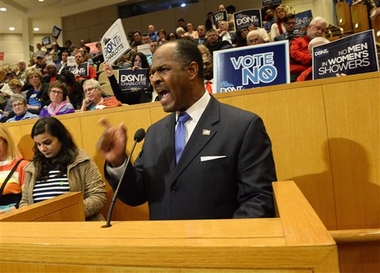What We Know: 'Bathroom bills' assert transgender rights

CHARLOTTE, N.C. (AP) — The city council in Charlotte, North Carolina, has expanded its anti-discrimination ordinance to include sexual orientation, gender identity and marital status. The law has many aspects, but public debate has focused on how it legalizes the ability of transgender people to choose men's or women's bathrooms according to where they feel most comfortable. Gov. Pat McCrory says he will work with state lawmakers to overturn it. Here's what we know:
___
NATIONAL DEBATE: LGBT activists have pushed to expand anti-discrimination laws as sweeping changes take hold in the wake of the Supreme Court's legalization of gay marriage. LGBT advocates say nearly all of the nation's 20 largest cities fall under local or state nondiscrimination laws that allow transgender people to use whatever bathroom they identify with. As conservatives push back, they're finding success by raising concerns about bathroom safety.
___
BROADER PROTECTIONS: The anti-discrimination laws typically deal with much broader protections. The ordinance Charlotte approved Monday adds sexual orientation, gender identity and marital status as attributes protected from discrimination in public accommodations including restaurants, retail stores and other businesses. Public schools would not be affected by the law, which takes effect April 1.
___
WHAT'S NEXT: North Carolina cities and counties are creations of the state, which means the General Assembly can pass legislation cancelling the Charlotte ordinance or pre-empting any similar or regulations statewide. Legislators could also require such ordinances to be approved by voter referenda before they are enforced. The governor and leaders of the house and senate, all Republicans, said they will intervene. McCrory told the Associated Press that the Charlotte ordinance is "an extreme regulation that changes the basic norms of society."
Copyright 2016 The Associated Press. All rights reserved. This material may not be published, broadcast, rewritten or redistributed.
The Gayly - 2/27/2016 @ 1:22 p.m. CST





